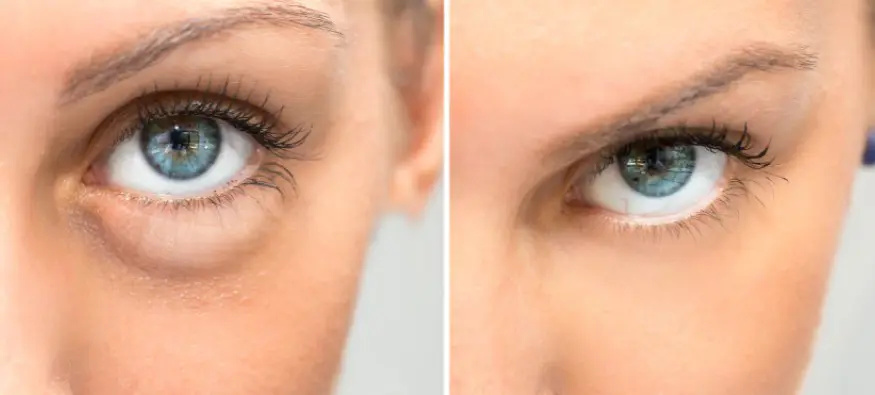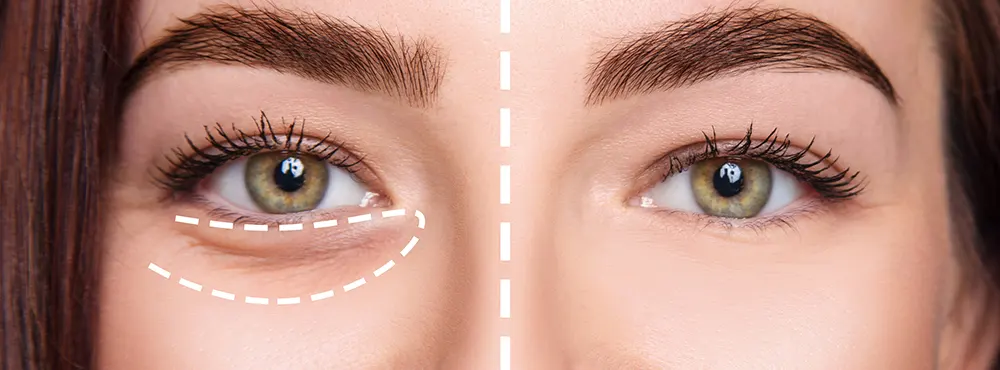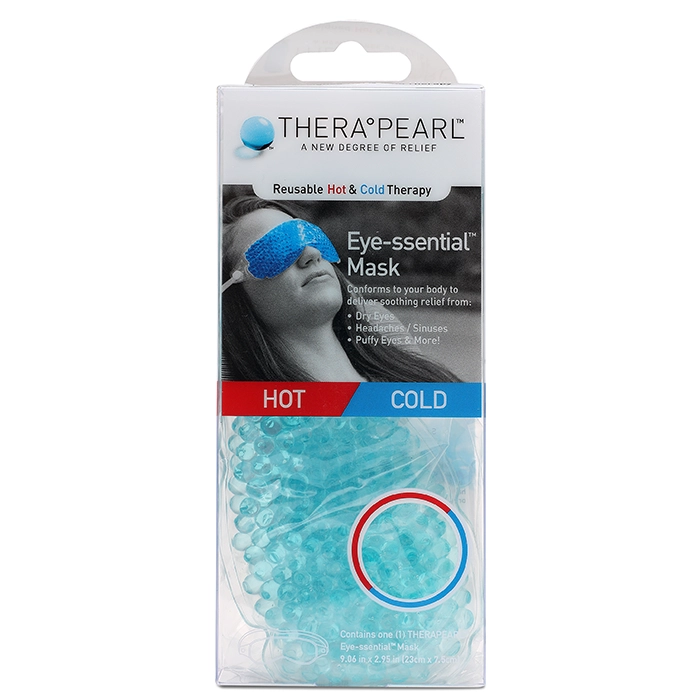Bags under the eyes can be a natural sign of ageing and appear as a mild swelling or puffiness. They occur due to the weakening of the tissue around the eyes, including the muscles that support the eyelids. The weakened skin relaxes and forms a pouch, which then fills up with fat and excess fluids, giving the eyes a swollen appearance. In most cases, eye bags are a harmless cosmetic issue. However, if there’s any pain, redness or itching that persists, consult your optician or GP without any delay.
Let’s learn in further detail what causes bags under eyes, their symptoms, how to get rid of bags under the eyes through medical options and home remedies, as well as how to prevent them.

What causes bags under eyes?
Bags under the eyes can be caused by many biological and lifestyle factors, including:
Fluid retention – Excessive intake of salt, drinking too much alcohol and poor sleep can contribute towards fluid retention.
Thyroid issues – underactive thyroids or Graves’ disease can cause swelling and puffiness around the eyes, leading to bags under the eyes.
Allergies – Seasonal allergies and dust can cause swollen, puffy and inflamed eyes, emphasising the appearance of under-eye bags.
Stress – Stress can disrupt the balance of fluid and salt within the body, which may contribute to puffiness around the eyes.
Poor sleep – There’s a reason it’s recommended to never compromise with your ‘beauty sleep’. Lack of sleep can cause the eyes to appear tired and puffy.
Smoking & alcohol – Smoking and consumption of alcohol can cause the blood vessels under the eyes to dilate, which may lead to increased pigmentation and puffier eyes.
Genetics - Eye bags can also be hereditary and linked to genetics.
Excess salt consumption – Salt causes fluid retention in the tissue around the eyes, causing swelling under the eyes.
Conjunctivitis – Allergic conjunctivitis can also lead to puffy eyes, although not a direct cause.
Symptoms of bags under the eyes
Now that you’ve learnt what causes bags under eyes, here are the symptoms to look out for:
- Swelling – Caused by fluid retention, fat build-up or allergies.
- Saggy or loose skin – Occurs with ageing as the tissues around the eyes weaken.
- Dark circles – Caused by the thinning of the skin.
How to get rid of bags under the eyes
Home remedies and lifestyle changes can help reduce the appearance of bags under the eyes. However, some individuals turn to medical options.
Medical options for undereye bags
Various medical options can improve the appearance of undereye bags and, in some cases, even eliminate them altogether. These procedures can be surgical or non-surgical.
Nonsurgical
Many anti-ageing non-surgical treatments are being promoted to reduce puffy eyes. Laser resurfacing, chemical peels and fillers can help get rid of saggy skin, improve skin tone and reduce eye bags.
Laser resurfacing – Laser resurfacing is a treatment used to brighten up the under-eye area and reduce the appearance of eye bags. It involves using a laser to remove excess wrinkly skin under the eye and stimulate collagen production for firmer skin.
Tear trough fillers – These fillers can be used to restore volume and reduce the appearance of dark circles under the eyes. This procedure involves injecting filler (usually hyaluronic acid) between the cheek and lower eyelid to create a smooth transition. Although results typically last between 6 and 12 months, this duration varies from person to person.
Chemical peel – Chemical peels can be used when under-eye bags develop. The treatment involves removing the top layers of the skin. Once the area is healed, the new skin that grows is stronger and thicker, preventing the bags from returning as easily.
Surgical
Depending on the cause of your eye bags, eyelid surgery (blepharoplasty) may be recommended to remove eye bags or correct drooping eyelids. This is an outpatient procedure carried out under local anaesthesia with sedation. A surgeon will make an incision, usually inside the lower eyelid or under the eyelashes, to remove excess fat. This procedure is called a lower lid blepharoplasty. However, it is more effective for upper lid excess skin. In the case of lower lid blepharoplasty, the scarring that may occur afterwards can cause the eyelids to be pulled away, which unfortunately increases the risk of dry eyes.
Home remedies to get rid of the bags under eyes
Although there is a lack of strong evidence that home remedies can help eliminate under-eye bags, they can still help reduce them if followed religiously.
Drinking plenty of water – Staying hydrated throughout the day can help reduce bags under the eyes by assisting your body in flushing out toxins that cause swelling.
Cucumber slices – As an alternative to chilled spoons, you can also use cucumber slices. This refreshing remedy will de-puff the eyes by restricting blood vessels with its caffeic acid. The vitamin C in cucumber also helps to soothe the eye area.
Cold compress – Applying a cool compress or ice globes to the eyes can also provide a therapeutic treatment for eye bags, reducing the puffiness. The Thera-Pearl Eye Mask is a compress which can be used hot or cold to rejuvenate eyes, reducing puffiness and eye bags.

 Offers
Offers Account
Account
 Favorite
Favorite
 Basket
Basket

 OFFERS
OFFERS


















